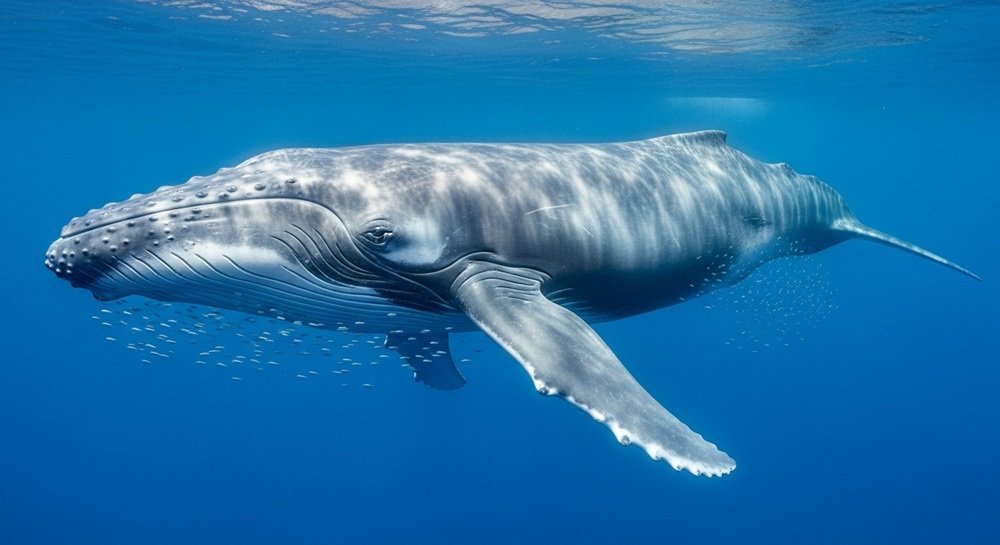Blue Whales Going Silent: The Ocean’s Fading Voice
- Introduction: A Sound That Once Moved the Sea
Blue whales, the largest animals to ever exist on Earth, are known not just for their size but for their song. Their vocalizations are low, deep, and resonant can travel hundreds of miles across the ocean. These majestic calls have long been a symbol of the deep, hidden language in the vast, dark waters of the world’s oceans.
But now, that sound is disappearing.
In recent years, marine scientists and conservationists have noticed an eerie change. Blue whales, once famous for their haunting underwater songs, are going silent. Their calls are less frequent, less powerful, and in some cases, nearly absent. While whales don’t speak in words, their silence speaks volumes about the state of the oceans and perhaps, the fate of the species itself.
This silence isn’t just about a loss of sound; it may represent a broader, deeper crisis in marine life. The disappearance of blue whale vocalizations is a warning. And it’s one we cannot afford to ignore.
- The Language of the Deep: Why Blue Whales Sing
To understand the importance of this silence, we must first understand what whale songs mean.
Blue whale vocalizations are among the lowest and loudest sounds made by any living creature. Their calls register at frequencies as low as 10 hertz far below the range of human hearing and can reach volumes of nearly 190 decibels underwater. That’s louder than a jet engine. But the purpose of their song is not volume it’s distance. These calls are designed to travel across ocean basins.
Whales use these sounds to communicate with one another, to navigate vast territories, to locate food, and most critically, to find mates. In some species, like the humpback whale, songs are complex, evolving melodies. In blue whales, the songs are simpler but no less essential short pulses and low moans that carry meaning across miles of sea.
When a blue whale stops singing, it isn’t just quiet. It’s disconnected.
III. The Shift: Growing, Global Silence
In recent years, marine researchers monitoring ocean acoustics have noticed a disturbing trend: blue whales are singing less, and when they do sing, the calls are fainter and lower in pitch than before.
In some regions, such as off the Pacific coasts of North and South America, days or even weeks pass with no blue whale calls detected at all. In areas where whales were once reliably heard during migration or feeding seasons, the soundscape is now disturbingly empty.
This is not a minor change. For a species that relies on long-distance communication, the reduction in song can impact everything from breeding success to survival. It is a signal that something is deeply wrong in the ocean.
- Causes of Silence
There are several theories as to why blue whales are going silent, and it’s likely that no single factor is to blame. Rather, silence is the result of multiple overlapping pressures, all connected by human activity and climate change.
- Food Scarcity and Ocean Warming
Blue whales feed primarily on krill tiny, shrimp-like creatures that gather in dense swarms. A single adult whale can consume up to 4 tons of krill per day. These grills rely on cold, nutrient-rich water to survive and reproduce.
But as global temperatures rise, ocean currents shift, and surface waters warm. This disrupts the upwelling of cold water from the deep, which in turn reduces krill populations. When whales cannot find enough food, they must travel farther, dive deeper, and expend more energy. Singing an energy-intensive activity becomes a luxury they cannot afford.
This connection between hunger and silence is perhaps the most straightforward. A starving whale is a silent whale.
- Ocean Noise Pollution
Another major factor is the increasing level of human-made noise in the oceans. Ships, oil rigs, underwater construction, and military sonar all contribute to an underwater environment that is now filled with mechanical sound.
These noises can drown out whale calls or make communication impossible over long distances. Whales may respond by lowering their voices to avoid masking, changing their call patterns, or simply going quiet altogether.
In effect, the ocean’s natural symphony is being drowned in industrial noise and the whales, sensitive to frequencies we barely detect, are retreating into silence.
- Stress and Environmental Disruption
Beyond hunger and noise, blue whales are also facing rising stress levels from constant environmental changes. Sudden shifts in temperature, ocean acidification, plastic pollution, entanglement in fishing gear, and vessel collisions all contribute to a dangerous, unpredictable habitat.
When an animal is under especially prolonged stress, chronic stress may alter its behavior in dramatic ways. For whales, this could mean reduced vocalization, avoidance of breeding grounds, or even failure to reproduce entirely.
- Why Silence Matters
To some, a whale not singing might seem like a small or even poetic detail. But in the context of conservation, the loss of blue whale song is a red flag with enormous implications.
- Communication Breakdown
If whales cannot hear or reach each other, they may fail to mate. This is especially dangerous for a species already recovering from historic whaling and classified as endangered in many regions. Fewer successful matings mean fewer calves and a slower road to recovery.
- Population Tracking
Scientists rely on whale songs to track populations. Passive acoustic monitoring is one of the most effective, non-invasive methods for estimating whale numbers, migration routes, and behavioral patterns. If whales stop singing, they become harder to study and harder to protect.
- Ecological Collapse Indicators
Whales are not isolated. Their silence could indicate widespread disruptions in the marine food web. If a top predator is falling silent due to hunger or stress, then the ecosystem supporting it is already breaking down.
- The Broader Picture: A Changing Ocean
The silence of blue whales is just one symptom of a much larger transformation happening in Earth’s oceans. Climate change is warming waters, altering currents, and pushing species out of traditional habitats. Ocean acidification is affecting shell-building organisms at the base of the food chain. Coral reefs are bleaching. Fish stocks are declining.
In this context, the loss of blue whale songs is not only tragic it’s symbolic. It represents the ocean losing its voice. The once-vibrant soundscape of the sea, full of clicks, chirps, songs, and pulses, is fading.
And in a way, whales are warning us. Their silence is a signal that the balance has shifted. That the systems sustaining life in the ocean and on this planet are under strain.
VII. Is There Hope?
Despite the dire warnings, there is still hope. The silence of the whales, while alarming, is not yet final. If we act now, we may still hear their voices echo through the deep for generations to come.
- Marine Protected Areas
Expanding and enforcing marine protected zones can shield key whale habitats from industrial activity, fishing, and noise pollution. These safe zones allow whales to feed, breed, and communicate freely.
- Regulation of Ocean Noise
New technologies and policies can reduce ship noise, reroute traffic away from sensitive areas, and limit the use of sonar in critical habitats. The ocean does not have to be loud, only safer.
- Combatting Climate Change
Global cooperation to reduce carbon emissions and mitigate climate change is crucial. Stabilizing ocean temperatures and restoring natural upwelling cycles can help bring krill populations back and with them, the whales’ songs.
- Public Awareness and Action
The story of the silent blue whales has emotional power. It reminds people that the consequences of climate change and pollution are not abstract; they are personal, living, and heartbreaking. As awareness grows, so does the pressure to act.
VIII. Conclusion: A Song Worth Saving
The silence of the blue whales is not just the absence of sound. It is the absence of safety, of balance, of connection. It is the fading of a world that was once full of song, rhythm, and life.
But silence is not the end of the story. If we really listen it can become the beginning of something else: understanding, urgency, and ultimately, action.
There is still time to bring the songs back. To restore the conditions where blue whales, the great giants of the sea, can once again fill the oceans with their beautiful, ancient voices.
And when they do, it won’t just be a victory for them, it will be a chorus for us all.





